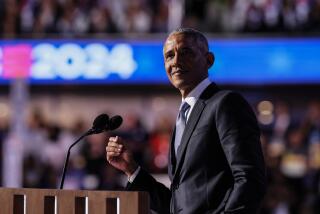On beyond civil rights
- Share via
ABarack Obama presidency could end the Iraq war, transform our national energy policy, revive America’s standing in the world -- but please don’t expect the first black man in the Oval Office to move us above and beyond the civil rights era. At least that’s what Obama himself suggested last Monday in his speech to the NAACP. In a campaign fueled by high expectations, Obama seemed to be trying to lower his audience’s hopes that the election of the first black president would be anything more than a symbolic milestone.
“Just electing me president doesn’t mean our work is over,” he told civil rights activists.
A day earlier, NAACP Chairman Julian Bond drove home the same point but with just a little bit more gusto. Obama’s candidacy, he assured the audience, does not “herald a post-civil rights America, any more than his victory in November will mean that race as an issue has been vanquished in America.”
Given the, um, audacity of hope, it’s more than a little noteworthy that Obama and his supporters are suddenly pushing realism. Are they objectively wrong when they say an Obama victory won’t end the struggle for racial equality? Certainly not. But downplaying the symbolism and real-life racial significance of an Obama presidency ignores the fact that it would ultimately challenge the nation’s civil rights establishment, and its policies and rhetoric, which routinely question the fundamental fairness of American society.
All of this is particularly interesting given the enthusiasm for Obama’s candidacy in some conservative quarters. Anti-affirmative-action activists Ward Connerly and Abigail Thernstrom, for instance, are seeing greater historical significance in an Obama victory than many Obama supporters themselves. To them, large numbers of white voters willing to vote for a black man signals a welcome sea change in whites’ attitudes toward blacks. And to them, that means that what they’ve been saying all along is right: Race-based policies designed to redress inequality and past discrimination have outlived their usefulness. That’s an idea many Democrats are loath to accept.
In the meantime, voters seem to be reading a whole lot of racial significance into an Obama triumph. According to a recent USA Today/Gallup poll, about two-thirds of blacks and Latinos and just over one-half of whites agreed that an Obama victory would improve race relations. Blacks were the most optimistic, with 23% saying it would make race relations “a lot better,” compared with 13% of whites. Similarly, 85% of blacks said an Obama win would be a sign of progress toward racial equality in the U.S.
But does this mean that blacks would see a President Obama as a black leader who “speaks” for them, a leader in the mold of civil rights advocates? Asked who they would choose if they had to pick one individual to speak for them on issues of race, 29% of black respondents selected Obama. Although he got the most support as spokesman, 49% named someone else, and nearly a quarter named no one.
This suggests that although blacks overwhelmingly support Obama, they do not see him as their racial representative. And in a country in which prominent blacks, elected or not, are routinely expected to speak for all 40 million African Americans (and, most likely, no one else), that is a further challenge to the civil rights model, in which the few speak for the many.
It means that Obama is broader than one demographic category. Something similar happened when the very Irish Al Smith became governor of New York in 1918 and the famously Catholic John F. Kennedy entered the White House in 1960. While never forgetting his ethnic base, Smith broadened his outlook and appeal. JFK did the same with Catholics. Smith became Irish-plus; Kennedy was Catholic and a whole lot more. In their cases, their white ethnic and religious identities melded into the broader category of whiteness, and in some ways, they carried their groups with them into the larger whole.
So far, no one knows what will happen to black identity if Obama is elected. But no matter how many props he gives to his civil-rights-era elders, blackness is not likely to remain within the civil rights mold. For one thing, if reporters were to ask President Obama what “his people” thought about any given issue, he’d be expected to respond on behalf of the whole and not just the part. In other words, the most powerful black politician in U.S. history could not be expected to play the role of “black leader.”
More to Read
Sign up for Essential California
The most important California stories and recommendations in your inbox every morning.
You may occasionally receive promotional content from the Los Angeles Times.













